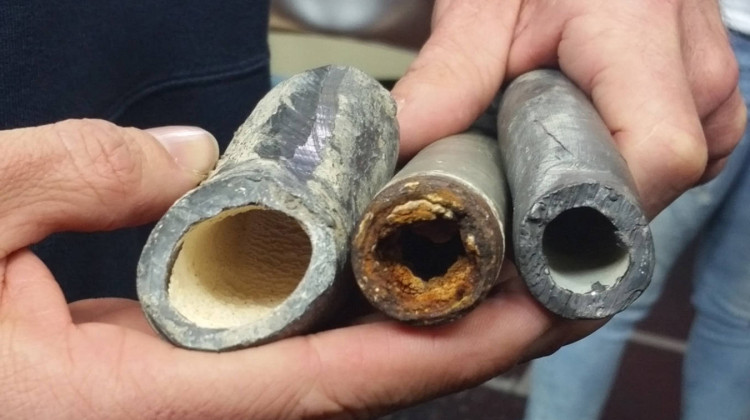
An Environmental Protection Agency civil engineer shows how corrosion control treatments can affect lead pipes. The one on the left was treated, the middle one was not, and the one on the right is a new pipe.
Lauren Chapman/IPB NewsIndiana will receive about $127 million in water infrastructure funding over the next five years from the federal infrastructure law — about half of it will go to disadvantaged communities. The funding will pay for things like lead pipe replacements, septic repairs, and cleaning up PFAS contamination.
But how Indiana defines a “disadvantaged community” could exclude some Black and Brown neighborhoods disproportionately harmed by lead.
At the Indiana Water Summit, Jim McGoff of the Indiana Finance Authority said every state was allowed to make its own definition of a “disadvantaged community.” While the IFA recently revised that definition to allow more communities to be eligible for funding, the definition doesn’t specifically mention race or ethnicity.
McGoff said the IFA primarily plans to focus on lower-income communities — where households make roughly $46,000 a year or less.
“We chose to focus on median household income for these — this next five years for ease of interpretation. Because if we get into looking at all of the factors, it becomes a negotiation and it’s very difficult to manage," he said.
McGoff said prioritizing income will be easier for communities applying and consulting engineers.
But the Biden administration did mention race and ethnicity under guidance for how to define disadvantaged communities under its Justice 40 Initiative.
Barbara Bolling-Williams is the president of the Indiana State Conference of the NAACP. She said the state is trying to redirect some of the funding meant to address harms done to Black and Brown communities.
“We demand justice, we demand inclusion, we demand that our communities now be standing at the front of the line for the dollars that have been allocated," Bolling-Williams said.
READ MORE: Alliance to Buttigieg: Reject Indiana's inequitable electric vehicle plan
Join the conversation and sign up for the Indiana Two-Way. Text "Indiana" to 73224. Your comments and questions in response to our weekly text help us find the answers you need on statewide issues, including this series on climate change and solutions.
Garry Holland is the education chair of the Indianapolis branch of the NAACP. He said it's especially important that lead pipes get replaced in communities where Black people currently live — not just in areas that have been gentrified.
"We need to repair these lead pipes, but the people have moved out who used to live there. And that's an injustice when you look at the people who have been affected," Holland said.
The Indiana NAACP and other groups in a new alliance have also asked the federal government to reject Indiana's plans for electric vehicle chargers due to equity concerns.
The IFA is still working to find out which lower-income areas of the state should get priority for the water infrastructure funding. McGoff said this new funding would help the IFA to target more urban areas than it has before.
Contact reporter Rebecca Thiele at rthiele@iu.edu or follow her on Twitter at @beckythiele.
9(MDAyMzk1MzA4MDE2MjY3OTY1MjM5ZDJjYQ000))
 DONATE
DONATE







 Support WFYI. We can't do it without you.
Support WFYI. We can't do it without you.